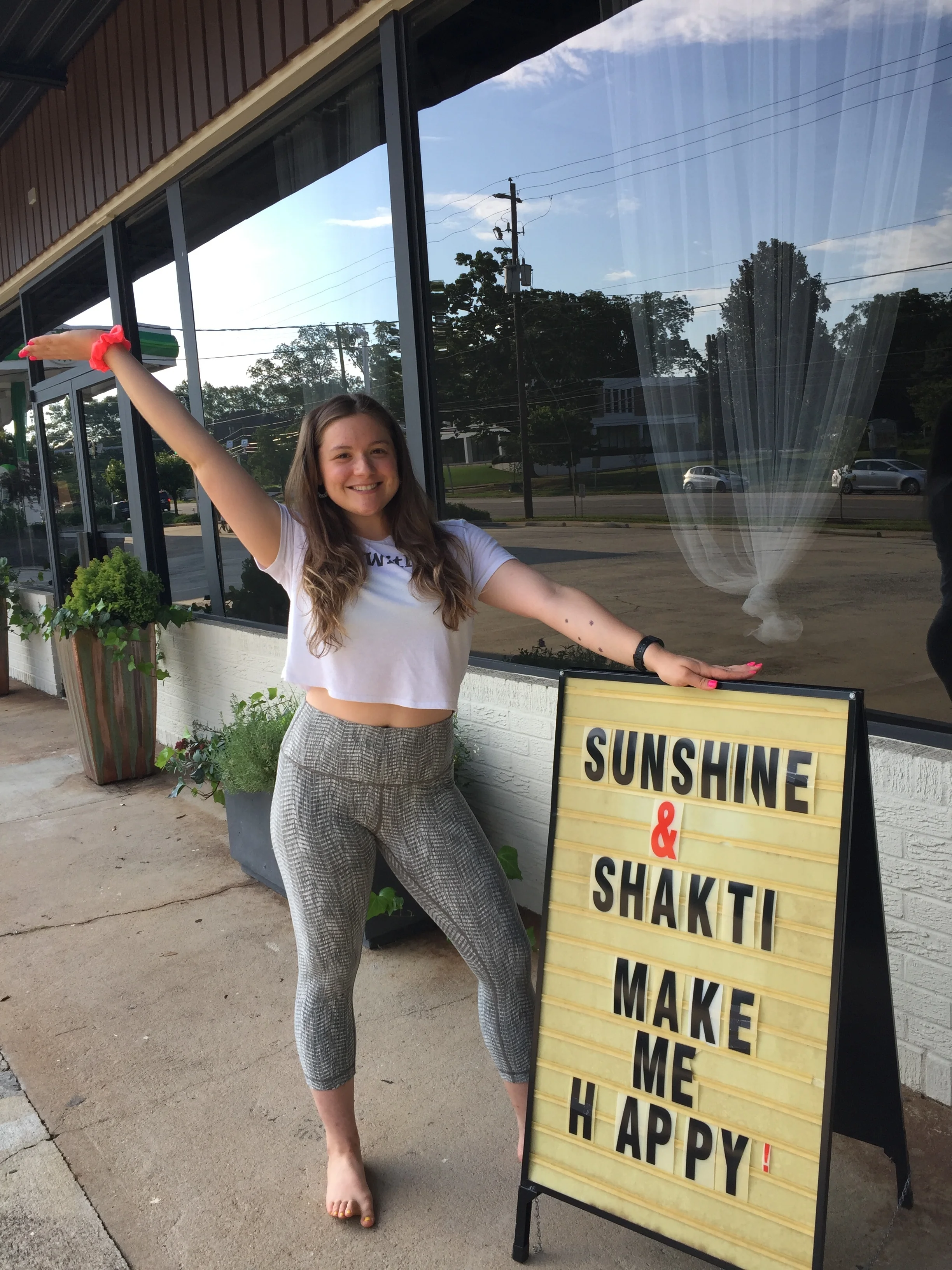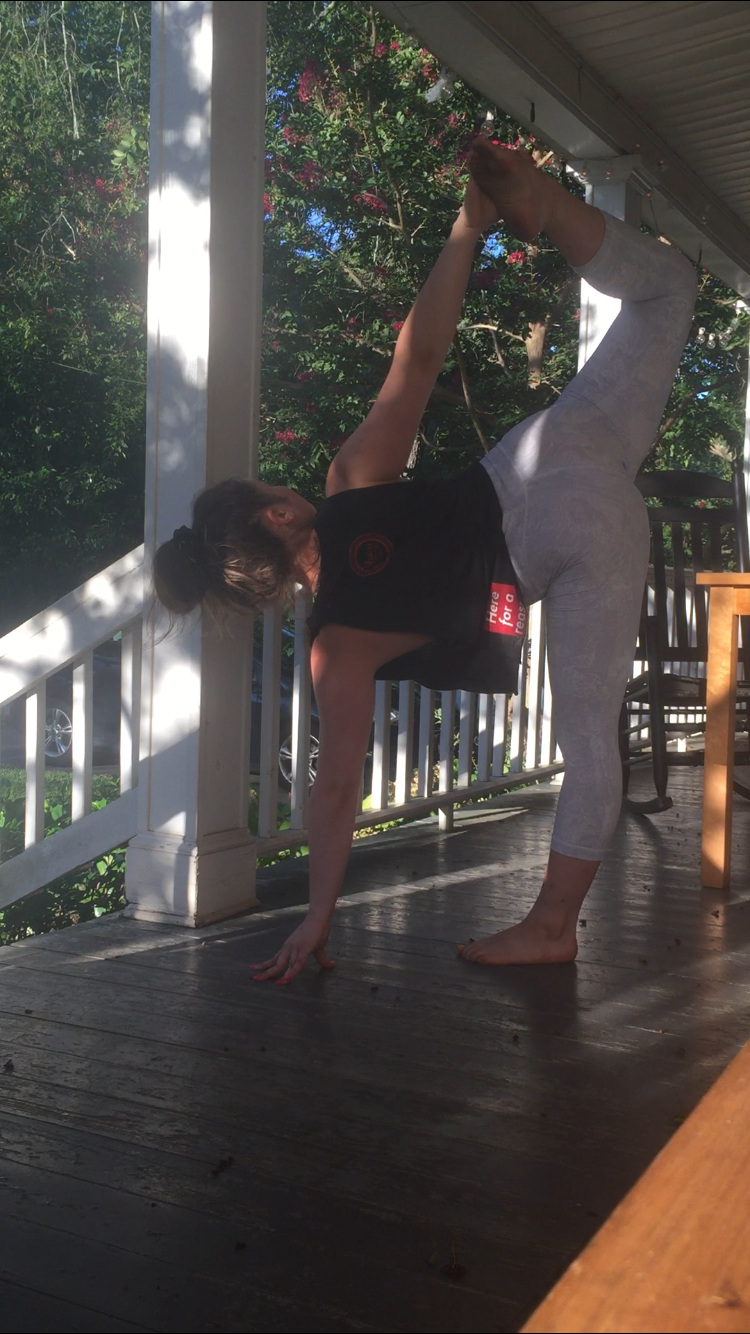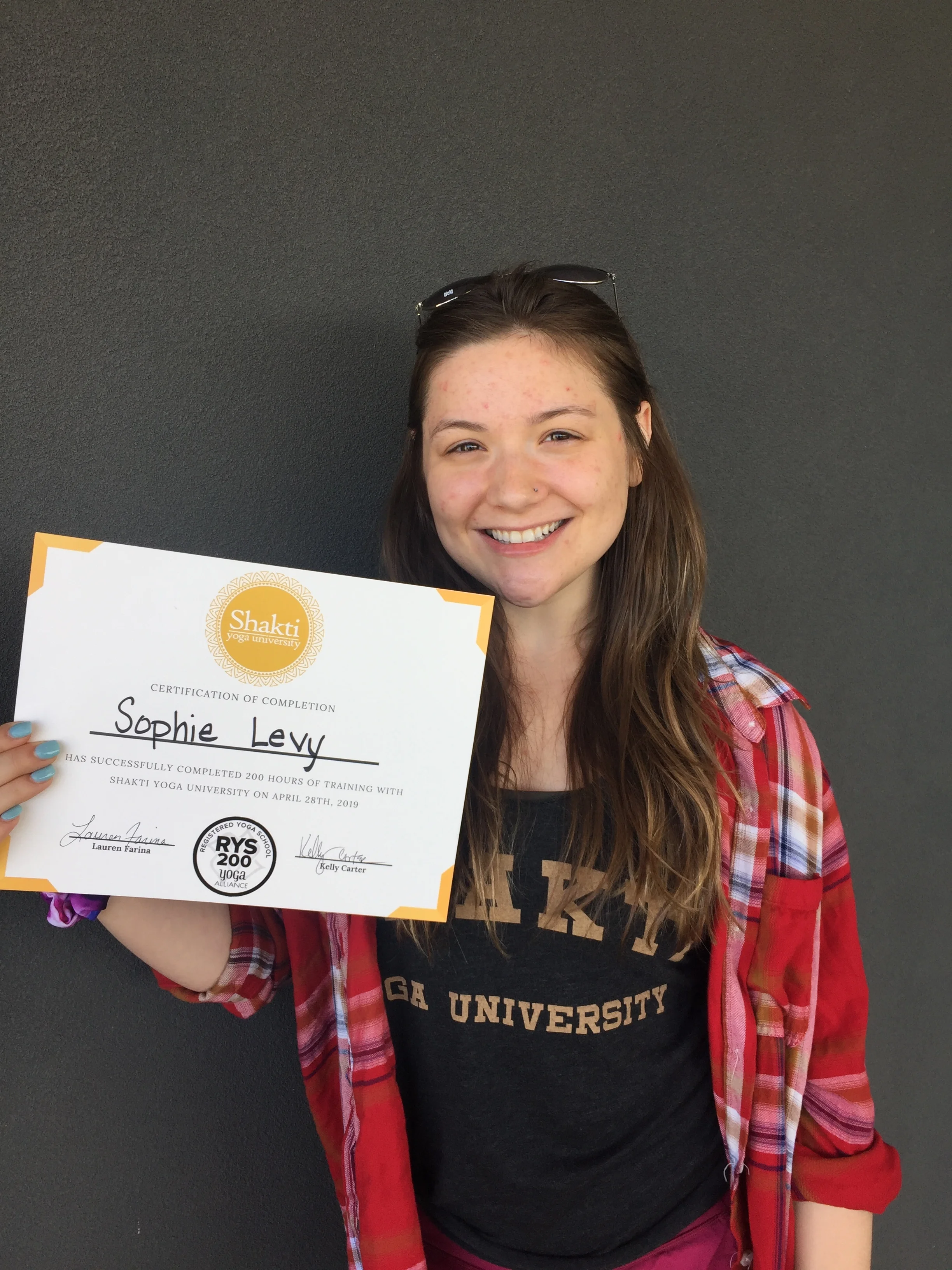Lies We Tell Ourselves
Hi. I’m Sophie.
I’m a student and teacher at Shakti.
I want to talk about lying.
Lying is funny, in that it’s almost always done with good intentions but almost always hurts someone. So, why do we do it, still? There is always something that we get out of it. A reason we keep doing what we do.
Before yoga teacher training, I hadn’t heard of the concept of “my lie.” These words have a very specific meaning in the world of Baptiste Yoga. Everyone has a “lie.” It’s something that we tell ourselves about our self that shapes all of our experiences. Baron Baptiste breaks it down in his book “Being of Power”:
“Here’s how it works. It begins with something painful or challenging that happened in our past. It could have been a difficult incident or an experience of loss, big or small, that we perhaps consider significant. Whatever it was had an effect on us, because we took it personally. We made it mean something about ourselves, as in we’re not good enough, smart enough, pretty enough, skinny enough, worthy enough, desirable enough, loveable enough, and so on. We internalize that lie and transmute it into the truth in our minds; thus, it becomes a deep belief system. Although totally unconscious to it, that’s the perspective from which we go about our lives… At some point you’ve probably made a declaration similar to this: “I’m all alone. I’m not safe. I’m a freak. I’m not worthy of love. I’m stupid.” You gave yourself a judgment and have been living with it as a silent belief of “that’s just who I am.” But it’s not actually who you are; it’s just something you made up. When you really get this insight, it changes everything, because you see that the story isn’t real. Something happened, you had an interpretation about what it meant about you, and you conflated those two things into a fixed truth. In reality, life is totally malleable, and so are you. It’s not a fixed and forever truth that you’re weird, alone, unwanted, not enough, or whatever other belief you’ve been living.” Excerpt From: Baron Baptiste. Being of Power.
In Baptiste training we are taught how to find our lies, examine how they have shown up throughout our lives, and then how to defy them = how to create a new way of being that is not rooted in our lie. My lie has shown up my whole life without me knowing it until recently. My lie is that I am powerless. Powerless to my depression, my disordered eating, my racing thoughts, the waves of sadness I feel with the smallest loss. At some point in my life, I became convinced that I couldn’t handle these things on my own. I wasn’t capable.
Let me make something clear. There is nothing wrong with needing help. Everyone needs and deserves help. Feeling powerless is akin to feeling useless, aimless, defeated, with no shadow of purpose to pull you up into effort.
When I was learning about my lie and exploring it,
the most obvious way it showed up was in my relationship with food.
I’ve engaged in binge eating throughout my adolescent and adult life and developed an addiction to sugary foods somewhere along the way. Sure, all kids love sugary foods, but it always felt like something more than a sweet tooth. Since a young age, I would secretly store candy and sweets in my room and then eat them all when I was all alone. This would all be in secret, because I felt immense shame when someone would catch me eating sweets. I, like most children, was taught that fat is bad, sugar is bad, and I made my sugar cravings mean something about myself. When I developed an addiction, I made it mean that I was powerless to my disordered eating. And for a time, I was. This got a lot easier to do in college when I was living on my own and didn’t have to hide it from my parents, but it also got worse. At that point, I could eat more, hide less, and blame binges on being drunk or high when the shame inevitably crept up. I experienced multiple waves of depression in college, and my emotional dependency on food, specifically sweets, got stronger. Any time I had an inkling of wanting to quit binging, I would never REALLY try because I felt powerless to the control food had over me.
Around my junior year, I decided I wanted to really make a change. I tried doing Weight Watchers and committed to eating healthier foods. On the outside I was doing great: I bought healthy groceries, made good decisions, posted pictures of all of it. What I was really saying was, “This means I’m a good person. The way you eat reflects your moral character, so therefore people will know I’m a good person because of all the salads I eat.” And honestly, it worked. I started dating someone who was obsessed with healthy eating and exercise. I entered into a relationship in which the love was conditional upon my weight. And I thought to myself, “I’ve done it. Someone finally appreciates my eating habits and sees that I’m a good person because of them.” But it was never this simple.
When I would get upset I would buy pastries and candy and eat them in secret. I hid it from my boyfriend because I knew he loved me for being skinny and eating salads. I was ashamed to admit that to anyone, and the shame made me eat more to comfort myself, which made me more shameful, and on and on the spiral goes. I could never stop the secret binging. I felt completely powerless. So, whenever I was asked by my boyfriend why I was gaining weight (something that I now know is not always okay, but allowed to happen), I blamed it on everything but my eating habits: my birth control, drinking (even though I wasn’t a heavy drinker), social events. I knew I was gaining weight because I was eating pints of ice cream when I had nights to myself. But I couldn’t tell him, because that would mean confronting my emotional dependency on food, and what was the point when I was powerless to it?
In teacher training, I realized my lie was showing up as an excuse. While I should not have been trying to lose weight for my boyfriend, it is true that my habits weren’t healthy and would lead to problems in my future. I would go to a bakery every few weeks, buy 6 pastries, and then go home and eat them all. I would buy a dozen donuts to “surprise the office!” and eat 8 of them. I would get in a minor fight with my boyfriend and immediately drive to the store to buy bags of candy. I stopped confronting problems in the relationship altogether: rather than tell him when something was bothering me, I would push it under the rug and eat a jar of Nutella. All in secret.
And even though I didn’t want to be controlled by my cravings, I felt in my heart that I was powerless.
there was no reason to change anything.
What happened when I realized I was coming from a place of my lie:
It took me a long time to acknowledge my dependency on sugar. Just admitting and declaring that it was huge for me. It felt like a personal revolution surrounding food. But the insight of recognition didn’t turn into action. Believing I was powerless had its benefits, too: It was an excuse to not stop doing what I was doing. Deep down on a chemical level my body would do anything to keep getting that sugar even if that meant believing I was powerless and completely out of control of my behavior.
I used to feel like sugar had power over me. I believed the lie that I was powerless. When I stopped believing that lie, I was able to step in front of my addiction and come to terms with the work I had to do: therapy, accountability buddies, examining my relationship. I realized that I DID have power, I just had to do the work.
After I began to see my lie for what it was, I was able to look back on my life and identify other times I had acted in accordance with it.
After food, I saw how the lie had shown up in the ways I dealt with my depression, anxiety, and mania. Depression looks different for everyone. Some common symptoms that I experienced were lack of interest in usually engaging activities, loss of pleasure, fatigue, disturbed sleep patterns, social isolation, irritability, and general apathy.
In high school I began having long depressive episodes lasting multiple months at a time. Depression shows up different for everyone, but for me it came in waves lasting 3-5 months at a time. It’s hard to tease out the lie of being powerless from the truth of having depression. Lies are something we create, whereas depression is a chemical imbalance within the brain. Depression through the lens of my lie looked like something I couldn’t begin to conquer. My psychiatrist and therapist seemed like the only walls between me and an endless abyss of hopelessness. I was able to recognize that there was a way out, but I didn’t think I had anything to do with the removal of that wall. Take the meds, listen to the doctor, and hope for the best was all I could muster. Looking back, I realize there was, and is, so many things I can do to comfort myself and alleviate symptoms of depressive episodes. Managing depression from a place of power looks like recognizing when an episode is coming on and taking proactive measures: practicing yoga to gain awareness, talking to loved ones and letting them know what’s happening, being social, eating intuitively, developing routines.
My lie played into my yoga practice, too. For months I avoided meditation. I hated getting still and sitting with my emotions because I felt powerless to my racing thoughts and was afraid of what I would find if I paid attention to them. I was afraid that dark thoughts would come up, and at the time I believed I was powerless to them. I believed that they would consume me and I would fall into obsessive spirals of anxiety, which in the past had been a precursor symptom to a depressive episode.
On the first day of YTT, our leader asked, “Does anyone hate meditation?” My hand shot up. I explained to everyone how I was afraid, how it felt impossible to slow my thoughts. I explained my resistance by my inner voice saying to me, “You can’t handle your thoughts. You can’t handle sadness. Your thoughts will cause sadness and therefore you cannot handle what will happen if you get still and present.” So I didn’t- until I had to. I had to meditate daily for YTT, and at first it was very difficult. Over time I learned techniques that allowed me to observe my thoughts rather than reacting to them. Letting every thought come in, labeling it without judgement, and letting it float by, was a very different practice than my usual way of trying to fix every problem that popped into my head. After I recognized my lie looked like, meditation looked like telling myself over and over, “You are not your thoughts.” I was able to see my thoughts, set them aside, and drop the urgency to figure them out. Meditation creates space between stimulus and response. When I drop the lie that I am powerless, I can observe whatever darkness bubbles up and see it for what it is: thoughts. Just thoughts. And I am not my thoughts.
The most recent way my lie showed up was in my breakup. The same relationship mentioned above lasted almost three years. The second half of it was dominated by me feeling bad about myself and him not understanding why I was so sensitive about issues surrounding food. Even though I knew parts of our relationship were unhealthy, the split was heartbreaking. Part of why I didn’t like meditation was because there were a few thoughts that were persistent: my relationship was unhealthy, and something had to change. I knew I was no longer experiencing unconditional love. My relationship, no matter how wonderful on the surface, was not a safe space where I could grow and evolve. And every time this came up in meditation, a piece of my heart would break. These thoughts were scary, and my powerless voice told me that I wouldn’t be able to handle a breakup, and therefore I should avoid these thoughts that I knew would lead me to a split. The cognitive dissonance of loving him but accepting the state of our relationship caused lots of distress, and I don’t think I would have been able to tease this all out if I hadn’t been in YTT at the time. But my lie of powerlessness told me I wouldn’t be able to survive without him. I would never get over this guy, my inner voice told me. And sometimes it still feels that way- but that’s okay. Coming from a place of power meant realizing that I am strong and I could, and can, handle any loss that comes by way. He will always have a piece of my heart, and I will probably always love him, and it feels powerful to admit that. It feels powerful to accept the loss, grieve it, and recognize that this too shall pass. It feels powerless to do what I did in previous breakups: ruminate and sacrifice my thoughts and feelings for the sake of keeping a connection that no longer served me alive, only because I was scared to lose it.
This breakup was hard. Dealing with disordered eating is hard. Depression and all that it brings is hard. But when I look at it all without the lens of powerlessness on, it gets manageable. Defying my lie has been life changing, because it’s a complete transformation of the way I perceive and respond to challenges. It is still a practice, though, and I am often tempted to believe my lie. It would be a heck of a lot easier to believe that I didn’t have any power and just let things happen to me. But that is not where growth happens. Growth happens in the fire of discomfort. Growth is happening now that I prioritize myself by meditating daily to feel present and notice if my lie is showing up. I defy my lie in different ways each day, but I haven’t been the same since I discovered it.
The most critical part of exploring your lie is remembering that it is a lie. In my circle of yoga-minded friends that have also done this work, we often ask each other: “But how do we KNOW it’s a lie? It’s been proven over and over to be true?” And while that may seem like the case, that is exactly what your lie-believing mind would have you think.
Ultimately we get to decide what we believe about ourselves, and we all have the choice to exist with our lie dictating our actions or we can step in front of it.
When I realize that powerlessness is a lie, I can choose how I respond to situations rather than impulsively react to them. I believe that my lie is a lie not just because the book says so, but because time and time again I have created better outcomes for myself when I recognize my lie showing up.




